Freehold (732) 294-9393
Freehold (732) 294-9393
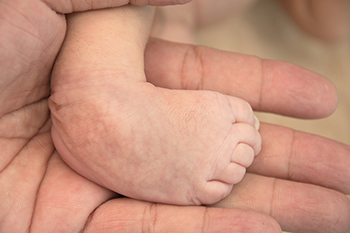
A rare foot condition that is generally identified after birth is known as clubfoot. Typically, one foot is affected in babies that are born with this condition, and in some cases, both feet have been afflicted. It is defined as an ailment that turns the foot sharply inward while the toes point towards the other foot. Children who have clubfoot try to maintain balance and can wobble as they walk. This condition often develops from genetic reasons, and it may be more prevalent among children whose mothers smoke or drink during their pregnancy. Many patients choose to manipulate the foot by performing specific stretches, as this may help to guide the foot into alignment. An effective treatment method is known as the Ponseti technique, and this involves putting the affected foot in a cast after it has been stretched into a normal position. This can be helpful in keeping the foot in the correct position until it is fully healed. If the clubfoot is severe or corrective treatment does not yield the desired results, surgery may be necessary. This can be beneficial in putting the bones, tendons, joints, and ligaments into their normal positions. If you would like additional information about clubfoot, it is strongly suggested that you consult with a podiatrist who can answer any questions you may have.
Congenital foot problems require immediate attention to avoid future complications. If you have any concerns, contact Dr. Henry Miller of New Jersey. Our doctor can provide the care you need to keep you pain-free and on your feet.
Congenital foot problems are deformities affecting the feet, toes, and/or ankles that children are born with. Some of these conditions have a genetic cause while others just happen. Some specific foot ailments that children may be born with include clubfeet, polydactyly/macrodactyly, and cleft foot. There are several other foot anomalies that can occur congenitally. What all of these conditions have in common is that a child may experience difficulty walking or performing everyday activities, as well as trouble finding footwear that fits their foot deformity. Some of these conditions are more serious than others. Consulting with a podiatrist as early as possible will help in properly diagnosing a child’s foot condition while getting the necessary treatment underway.
What are Causes of Congenital Foot Problem?
A congenital foot problem is one that happens to a child at birth. These conditions can be caused by a genetic predisposition, developmental or positional abnormalities during gestation, or with no known cause.
What are Symptoms of Congenital Foot Problems?
Symptoms vary by the congenital condition. Symptoms may consist of the following:
Treatment and Prevention
While there is nothing one can do to prevent congenital foot problems, raising awareness and receiving neonatal screenings are important. Early detection by taking your child to a podiatrist leads to the best outcome possible.
If you have any questions please feel free to contact our office located in Freehold, NJ . We offer the newest diagnostic tools and technology to treat your foot and ankle needs.
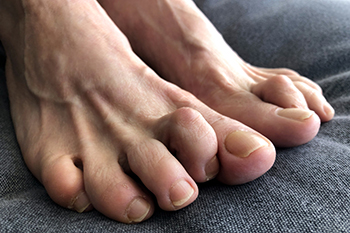
A foot condition that is considered to be a deformity can be referred to as hammertoe. It is a noticeable ailment that affects the toes, and pushes them into a bent position. The joint bends downward, often resembling a hammer. It is most often seen in the second, third, or fourth toes, and can cause difficulty in walking. It is known as an imbalance that affects muscles, toes, and ligaments, and may happen for various reasons. Some people have a predisposition to developing hammertoe, or it can come from wearing shoes that do not fit correctly. Additionally, it may happen if a foot injury has occurred, or from having weak calf muscles. Relief can be found when specific foot stretches are done, and performing regular exercise promotes healing and can improve flexibility. If you have this condition, please schedule an appointment with a podiatrist who can determine what the best course of treatment is for you.
Hammertoes can be a painful condition to live with. For more information, contact Dr. Henry Miller of New Jersey. Our doctor will answer any of your foot- and ankle-related questions.
Hammertoe
Hammertoe is a foot deformity that occurs due to an imbalance in the muscles, tendons, or ligaments that normally hold the toe straight. It can be caused by the type of shoes you wear, your foot structure, trauma, and certain disease processes.
Symptoms
Risk Factors
Treatment
If you have hammertoe, you should change into a more comfortable shoe that provides enough room for your toes. Exercises such as picking up marbles may strengthen and stretch your toe muscles. Nevertheless, it is important to seek assistance from a podiatrist in order to determine the severity of your hammertoe and see which treatment option will work best for you.
If you have any questions, please feel free to contact our office located in Freehold, NJ . We offer the newest diagnostic and treatment technologies for all your foot care needs.
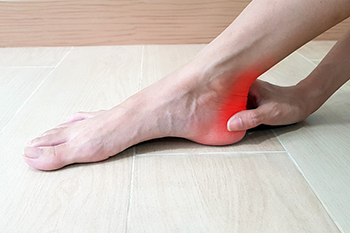
The Achilles tendon is defined as the tendon in the calf which connects the calf muscles to the heel. People who frequently participate in sporting activities may experience an Achilles tendon injury, and this can be common among runners. It is considered to be the strongest tendon in the body, and can become painful if an injury has occurred. Some of the symptoms that patients may have can include severe heel pain, the affected area can be tender when touched, and the back of the ankle may be swollen. If the Achilles tendon is affected during a foot injury, the patient may hear a popping sound at the time of the mishap, and there is often immediate pain. This tendon can become weakened from overuse, and this may be a result of repeated stress that happens gradually. Additionally, this type of injury may occur from wearing shoes that do not fit correctly, and increasing the intensity and speed of the chosen exercise too soon. If you have endured an Achilles tendon injury, it is strongly advised that you are under the care of a podiatrist who can diagnose it correctly, and offer prompt treatment.
Achilles tendon injuries need immediate attention to avoid future complications. If you have any concerns, contact Dr. Henry Miller of New Jersey. Our doctor can provide the care you need to keep you pain-free and on your feet.
What Is the Achilles Tendon?
The Achilles tendon is a tendon that connects the lower leg muscles and calf to the heel of the foot. It is the strongest tendon in the human body and is essential for making movement possible. Because this tendon is such an integral part of the body, any injuries to it can create immense difficulties and should immediately be presented to a doctor.
What Are the Symptoms of an Achilles Tendon Injury?
There are various types of injuries that can affect the Achilles tendon. The two most common injuries are Achilles tendinitis and ruptures of the tendon.
Achilles Tendinitis Symptoms
Rupture Symptoms
Treatment and Prevention
Achilles tendon injuries are diagnosed by a thorough physical evaluation, which can include an MRI. Treatment involves rest, physical therapy, and in some cases, surgery. However, various preventative measures can be taken to avoid these injuries, such as:
If you have any questions please feel free to contact our office located in Freehold, NJ . We offer the newest diagnostic tools and technology to treat your foot and ankle needs.
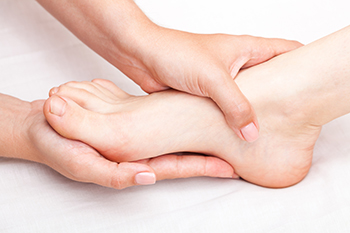
Common symptoms of the foot condition that is known as tarsal tunnel syndrome can include pain, numbness, and weakness in the toes and foot. There is a part of the foot that is called the tarsal tunnel, and is found between the ligaments that run across the foot and the inside of the ankle. Movement and flexibility are made possible by the nerves, arteries, and tendons that are within this tunnel, and repeated pressure on the nerves can cause tarsal tunnel syndrome. This can happen as a result of wearing tight shoes, an existing bony overgrowth in the ankle, or from a foot injury. Additionally, there may be current medical conditions that can cause this condition, such as diabetes, arthritis, or a thyroid disorder. Other symptoms that patients can experience include foot or toe pain, a sensation of an electric shock around the ankle or sole of the foot, and possible swelling. Relief may be found when compression stockings are worn, and specific medicine is prescribed. If you have developed this ailment, it is suggested that you are under the care of a podiatrist who can effectively diagnose and treat tarsal tunnel syndrome.
Tarsal tunnel syndrome can be very uncomfortable to live with. If you are experiencing tarsal tunnel syndrome, contact Dr. Henry Miller of New Jersey. Our doctor can provide the care you need to keep you pain-free and on your feet.
Tarsal Tunnel Syndrome
Tarsal tunnel syndrome, which can also be called tibial nerve dysfunction, is an uncommon condition of misfiring peripheral nerves in the foot. The tibial nerve is the peripheral nerve in the leg responsible for sensation and movement of the foot and calf muscles. In tarsal tunnel syndrome, the tibial nerve is damaged, causing problems with movement and feeling in the foot of the affected leg.
Common Cause of Tarsal Tunnel Syndrome
The Effects of Tarsal Tunnel Syndrome
A physical exam of the leg can help identify the presence of tarsal tunnel syndrome. Medical tests, such as a nerve biopsy, are also used to diagnose the condition. Patients may receive physical therapy and prescriptive medication. In extreme cases, some may require surgery.
If you have any questions please feel free to contact our office located in Freehold, NJ . We offer the newest diagnostic and treatment technologies for all your foot and ankle needs.
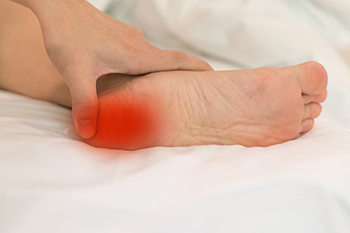
Heel pain is a common affliction that podiatrists treat on a daily basis. They see many different forms of heel pain emanating from injuries to soft tissues and other structures, breaks in bones, and arthritis. Soft tissue inflammatory conditions that cause heel pain include plantar fasciitis (inflammation of the plantar fascia tissue on the sole of the foot), Achilles tendonitis (inflammation of the Achilles tendon at the back of the ankle that connects the calf muscles to the heel), ligament sprains and muscles strains near the heel, and bursitis (inflammation of the bursa sac between the heel and the Achilles tendon). A fractured heel can vary from a small crack to a full break in the bone, and cause a great deal of heel pain. There are also different forms of arthritis, such as ankylosing spondylitis and reactive arthritis, which can cause pain and tightness in the heel. To have your heel pain properly diagnosed and treated, make an appointment with a podiatrist who can help devise an effective treatment plan to address your specific condition.
Many people suffer from bouts of heel pain. For more information, contact Dr. Henry Miller of New Jersey. Our doctor can provide the care you need to keep you pain-free and on your feet.
Causes of Heel Pain
Heel pain is often associated with plantar fasciitis. The plantar fascia is a band of tissues that extends along the bottom of the foot. A rip or tear in this ligament can cause inflammation of the tissue.
Achilles tendonitis is another cause of heel pain. Inflammation of the Achilles tendon will cause pain from fractures and muscle tearing. Lack of flexibility is also another symptom.
Heel spurs are another cause of pain. When the tissues of the plantar fascia undergo a great deal of stress, it can lead to ligament separation from the heel bone, causing heel spurs.
Why Might Heel Pain Occur?
Treatments
Heel pain should be treated as soon as possible for immediate results. Keeping your feet in a stress-free environment will help. If you suffer from Achilles tendonitis or plantar fasciitis, applying ice will reduce the swelling. Stretching before an exercise like running will help the muscles. Using all these tips will help make heel pain a condition of the past.
If you have any questions please contact our office located in Freehold, NJ . We offer the newest diagnostic and treatment technologies for all your foot and ankle needs.